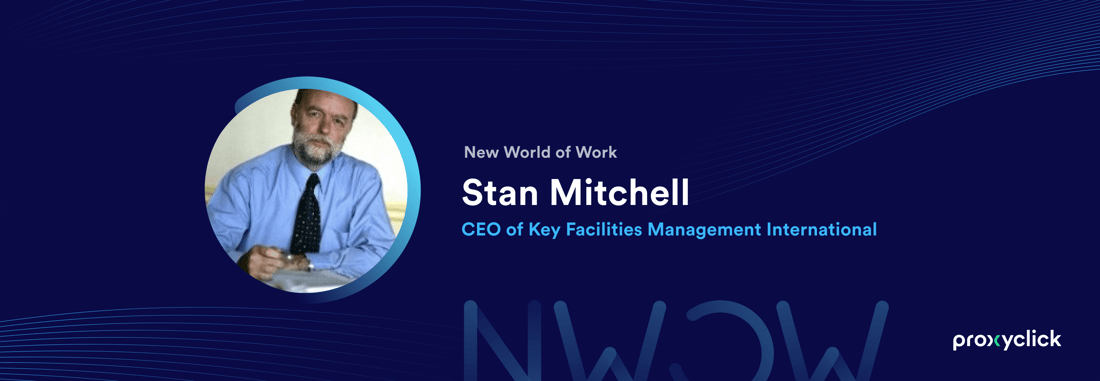How facilities management will move forward: 2020 learnings from a CEO

To kick off the Facilities Management edition of our New World of Work Series, Stan Mitchell, CEO of Key Facilities Management International, shares with us his biggest learnings from this year, and what he thinks are the key criteria for future facility managers around the world.
He stresses that there is no one-size-fits-all solution, as we’re constantly gaining knowledge about this pandemic as an industry, and those learnings need to be shared across the community for us all to truly benefit.
And the time to focus on and invest in workplace technologies is now, he says, “not just to help control the impact of this virus, but to help improve what [we] deliver within an FM context in its broadest sense.”
Tune into our full conversation below.
Welcome, Stan. Could you start introducing yourself, your role, and your organization?
Stan: My name's Stan Mitchell and I'm the CEO of Key Facilities Management International. Key is the oldest, longest established facilities management (FM) business in the UK. And, when I say FM, I mean, true FM: strategic, tactical management as opposed to facilities services. So, we are very much a white-collar business rather than a blue-collar business.
This is our 30th year in business, so, we've done something right because we're still here. We have developed the business on four different fronts. We are a consulting company, we do training quite extensively, we do outsourcing of operations, which we're doing currently in 21 different countries, and finally, more recently in the last five years, we've been involved in the development of technology for facilities management.
We're working with universities to better analyze the data that we derive from so-called 'smart buildings.' What we're focused on is 'smart FM.' So, how can we take the data that comes out of a building, translate it, analyze it, and give useful information back to the facility manager and so that they can make good use of it? (click-to-tweet)
I'm also involved in the development of standards in facility management, and I'm currently the Chairman of the ISO committee for Facility Management. We have published a number of standards already, ISO 41001 is the flagship management system standard. And actually, we’ve just launched our latest standard, which is ISO 41014, which is guidance on how to develop facility management strategies.
So, that's the potted history of both what I do in my day job and what I do, apparently in my spare time.
So, we've had quite a strange, interesting year. As we’re now in the fourth quarter of 2020, what can you really talk to about your learnings so far in facilities management, related to this pandemic?
Stan: I'll start on this occasion by talking about the world of ISO standards because if you think about what standards are, they are a collection of knowledge and expertise to capture that information and share it so that we all can potentially benefit from that. This month, the ISO technical committee for Facility Management is launching a new standard which will be the 41017, and that is regarding emergency preparedness for epidemics and pandemics.
We're trying to capture the knowledge and experience that's occurred in the last 12 months worldwide so that people in the future benefit from the learnings that we're all experiencing right now. In terms of Key Facilities Management, we're active in about 21 countries. Some countries have never shut down, and other countries seem determined to never open back up, and you've got everything else in between.
There's plenty of information out about what we should be doing as facilities managers. And, whilst it's giving us a kind of new dimension to what we would be doing normally, I do encourage people to see the positive as well as the negative in it.
The spotlight is on facilities management right now. We have a fantastic opportunity to demonstrate our professionalism and our value to the organizations that we serve. We need to go about it the right way, collectively sharing knowledge and experience. (click-to-tweet)
The biggest learning is there is no one approach, there is no one answer to what we as facilities managers should be doing.
Because we work internationally, what we found is, every country has a different strategy and opinion as to what we should be doing, every organization has a different strategy and opinion as to what we are doing, every building with an MD or a CEO in it has their different strategy about what we should be doing and how we should be doing it.
Then, the people that we actually serve in these buildings are the ones that will have varying degrees of hesitation when coming back into the workplace. And it's very important that we give those people confidence in our professionalism, and that we're doing all the right things that we need to do. Those right things include updating air conditioning, cleaning, preparedness for people who might feel ill in the workplace, etc.
Speaking a little bit about your specific organization, have you started sort of a return to work or return to the office? Do you have a plan in the works, or have people already gone back? What's the situation?
Stan: Well, we've got clients who basically have never shut down. But early on, inside our company, we developed a four-point plan that we shared with all of our people because a lot of our people obviously are based in the various countries where they work.
Our four-point plan was about making sure they understood there is no single answer, but giving a framework on risk assessment. What we were able to do was point [our employees] in the right direction to go and find out how their building services worked.
The fourth point in that plan encourages people to start again at point one once they arrive at point four because this is not a new norm, this is just a constantly changing norm.
And I think in most countries around the world, we've seen a decline in the cases of the virus and its impact on people. And then, as we start to relax all of us, it peaks up again and there's almost a guaranteed second wave of the pandemic. So, it is about being vigilant, and it is about being thorough - that's how we can demonstrate our professionalism.
Then, it is about networking. In FM, irrespective of this pandemic, I'm a great believer that none of us have got all the answers to anything.
We need to exchange knowledge and information to do the best job that we can. Hopefully, through this negative experience, we can raise the bar of facilities management as a strategic professional discipline, and then we all benefit from that. (click-to-tweet)
Definitely. And you mentioned some of the qualities and criteria that you think will make for people FM experts. Are there any other qualities or criteria that you believe are really crucial for future FM professionals’ success?
Stan: Well, as I mentioned, the new ISO standard is probably the biggest thing that we can collectively do. The U.S. is a very proactive participant in that committee, but we currently have 48 countries engaged and involved in the development of these standards. So that hopefully will be something with significant reach in terms of capturing our experiences this time around.
The second thing we can do, which we’re already doing at our company, is invest in and focus on the latest technology.
So, the ‘Industrial Revolution 4.0’ type technologies: AI machine learning, IoT, etc. We're already using many of these extensively in the workplace to monitor the environment. And that technology, as well as the price to implement it, is coming down very, very fast. (click-to-tweet)
I would recommend anybody in an FM role to go take a look at the art of the possible with technology because we're already using it in terms of social distancing. That seems to still be one of the most effective things to do in the workplace to stop the exchange of this virus.
The technology that we're using in FM can identify the crunch points within a building where social distancing gets diluted. This is particularly useful where the criteria changes from company to company, building to building, or country to country. (click-to-tweet)
So, if you as an organization haven't really taken a good look at today's technology that's available, there are really significant opportunities there. Not just to help control the impact of this virus, but to help improve what you deliver within an FM context in its broadest sense. We are finding that exceptionally valuable.
And, I know the outsourcing clients that we have are very appreciative of the knowledge and information that we are able to make that technology deliver and to inform them about what we're doing, how we're doing it, and how effective it is.
Absolutely. I think as a workplace tech company ourselves, we couldn't be in any more agreement that technology is the future, and that if you're not already digitalized in the workplace, this is kind of shining more of a spotlight on the necessary technology.
Stan: The bottom line is, facilities managers have a tough gig. It's not the easiest job in the world, it's not the job that's most recognized, and we need to just keep pushing the bar up. And, this pandemic provides us with a great opportunity, so we shouldn't miss it.
So thank you for doing interviews like this, because I do think it is important that we try and use this tech that we're all using today more effectively to get the messages out there and connect with each other.
Thank you again, Stan Mitchell!
If you'd like to be a part of the next edition of our New World of Work series contact us directly.
To learn more about how Proxyclick helps companies return to the workplace safely, book a demo with one of our experts.



